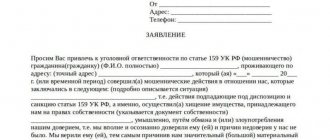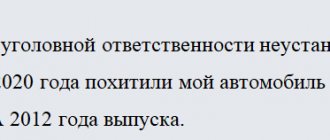The issue of legal regulation and the distinction between vehicle theft and theft has received a lot of attention from both legal theorists and law enforcers.
The Supreme Court of the Russian Federation expressed its legal position on this issue in the Resolution of the Plenum of December 19, 2008 No. 25. The issue of decriminalization of Art. 166 of the Criminal Code of the Russian Federation, which provides for liability for theft, the last time - in 2022. But the bill did not receive a positive opinion from the Legal Department of the State Duma of the Russian Federation.
Let us consider in detail the legal aspects of qualifying an act under Art. 166 of the Criminal Code of the Russian Federation.
The concept and characteristics of the crime provided for in Art. 166 of the Criminal Code of the Russian Federation
First of all, let’s understand what is the unlawful taking of a car or other vehicle without the purpose of theft. Theft of a vehicle, in accordance with Article 166 of the Criminal Code of the Russian Federation, means the seizure of not only a car, but also any other vehicle.
It is important what takeover is:
- is illegal
- and also committed without the purpose of theft (for example, for the purpose of a ride), that is, the thief does not have a selfish motive and selfish goal, he does not plan to appropriate the vehicle for himself or thus enrich anyone else.
As already mentioned, in accordance with Article 166 of the Criminal Code of the Russian Federation, theft of not only a car is punishable. In accordance with paragraph 21 of the Resolution of the Plenum of the Supreme Court of the Russian Federation dated December 9, 2008 N 25, such vehicles are those that require a special permit or special right to drive: for example, self-propelled vehicles, buses, trams, motor boats, and so on.
Will stealing a bicycle or rowing boat be punishable under Article 166 of the Criminal Code of the Russian Federation?
The same 21 paragraphs of the Resolution give an unequivocal negative answer to this question.
Of course, most often in judicial practice there are cases of car theft.
However, on December 9, 2022, the Baykitsky District Court of the Krasnoyarsk Territory found V.R. Ankoul guilty. and Kapchulenka A.R. in the attempted theft of a motor boat by a group of persons by prior conspiracy.
The victim secured his motor boat near the shore with a track, when he was returning home, he noticed that he and his boat were being watched by two guys who were not yet familiar to him - Ankoul V.R. and Kapchulenok A.R., and the latter was clearly intoxicated.
This circumstance could not help but alert the victim, so upon returning home, he asked his grandson to check the boat off the shore. It was the victim's grandson who discovered that two guys were in the boat, trying to start it. However, the victim installed a special Korean engine in the boat, which can only be started using the ignition key. The defendants did not have such a key, so they were unable to complete their criminal plan.
The court sentenced both guilty parties to a fine.
Terminology nuances
Theft in the literature is interpreted as temporary possession of a car, in which there is no purpose for its theft. For example, if your friend took your car for a ride without permission, then this offense will be classified as theft. And if the same friend sold your car, altering the documents and changing the license plates, then this is already theft.
Of course, this doesn’t make things any easier for you as the owner. But, according to the law, these concepts are interpreted differently. This means that different punishments are provided for them.
Corpus delicti
The corpus delicti is four elements, a set of characteristics (both objective and subjective) that makes it possible to define an act as criminal.
Let's consider the elements of the crime provided for in Article 166 of the Criminal Code of the Russian Federation (vehicle theft).
An object
That social relationship to which harm is caused (or the threat of such harm is created).
Theft of a vehicle is an encroachment on such an object as property relations. Optional objects may include road safety (if a trip is made in a stolen car) or even human health or life (if violence was used for the purpose of theft).
Objective side
This is the so-called external side of the crime. This element includes the action itself, prohibited by criminal law, and often also the consequences that occurred and the cause-and-effect relationship between them. In addition, signs of the objective side are the method of committing the crime, the situation and the time.
The objective side of the crime prohibited by Article 166 of the Criminal Code of the Russian Federation is the seizure of a vehicle.
The appeal ruling of the Supreme Court of the Russian Federation dated 09/07/2017 N 59-APU17-9 states that the objective side of this crime is expressed in the seizure of someone else’s car or other vehicle and its conversion into temporary actual possession by the perpetrator against the will and consent of the owner.
Paragraph 20 of the Resolution of the Plenum of the Supreme Court of the Russian Federation dated December 9, 2008 N 25 states that the objective side of this composition includes two acts:
- takeover
- and trip.
Moreover, they are not alternative, that is, in order for the theft of a vehicle to be considered completed, it is necessary that the person not only took possession of the car, but also started moving, that is, made a trip.
Subject
In accordance with the articles of the Criminal Code of the Russian Federation, this is a sane person who has reached sixteen years of age (and for some crimes - fourteen years of age).
The subject of a crime prohibited by Article 166 of the Criminal Code of the Russian Federation is a sane individual who has reached the age of fourteen (Article 20 of the Criminal Code of the Russian Federation).
Subjective side
Antonym of the objective side, the internal side of the crime, the attitude of the person committing the crime to his act. The subjective side includes guilt, motive and purpose.
The subjective side of theft is expressed by direct intent, that is, it is necessary to be aware of the socially dangerous nature of the act, as well as to desire the occurrence of socially dangerous consequences.
So, in June 2022, two criminals agreed in advance to commit a crime. Deliberately, jointly and in concert, on the night of June 7, they approached a VAZ-2106 car and used a folding knife to open the passenger seat door. After that, they were able to get into the car’s interior, and then, using the already known method (by jumping wires), they started the engine.
The travel distance was only 4 meters, after which the criminals crashed into a nearby house.
The court noted that the perpetrators actually had direct intent and consciously committed this act. At the same time, it is important to understand that the subjective side of this crime plays a very important role in qualifying the act, because it allows you to distinguish between theft of a vehicle and theft.
Paragraph 28 of the Resolution of the Plenum of the Supreme Court No. 25 states that the absence of selfish motives, that is, a selfish motive, when stealing a vehicle, gives the court grounds to classify this act under the relevant part of Article 166 of the Criminal Code of the Russian Federation in the presence of other elements of a crime.
Based on this, we can conclude that the absence of selfish motives is a criterion for distinguishing this composition from related ones related to the theft of a vehicle. During theft, a person does not have the goal of enriching himself at the expense of someone else’s property or turning it to his own advantage, since he plans to return the displaced vehicle to the owner.
This means that for qualification, only the absence of a purpose for the theft of a vehicle is important, namely the absence of circulation of the vehicle in favor of the subject of the crime or other persons. All other goals and motives that characterize the optional features of the subjective side of the crime will not matter for the qualification of theft. The presence of direct intent on the part of a person is a mandatory criterion.
Recommended reading:
What is the difference between car theft and theft?
Criminal legal characteristics of car theft
Bicycle theft
What is considered an assassination attempt?
When attempting a crime (Part 3 of Article 30 of the Criminal Code of the Russian Federation), all actions included in the objective side are committed, but the person cannot complete the criminal actions. This happens not at all because he changed his mind, felt sorry for the victim, decided to take the path of correction before committing the crime, but precisely because he cannot, that is, certain circumstances have arisen that do not allow him to complete the crime, but they are against the will of the subject.
As noted earlier, in accordance with paragraph 20 of the Resolution of the Plenum of the Supreme Court of the Russian Federation dated December 9, 2008 N 25, theft is a completed crime from the moment the vehicle begins to move . In this case, it does not matter at all whether the journey is 15 kilometers or 15 centimeters, the main thing is that the trip has begun.
Accordingly, an attempt to commit a crime prohibited by Article 166 of the Criminal Code of the Russian Federation is recognized as any action or any set of actions that are an attempt to break locks, turn off the alarm, or ignite the engine (clause 20 of the above-mentioned Resolution of the Plenum of the Supreme Court of the Russian Federation dated December 9, 2008 N 25) .
In accordance with Part 3 of Article 66 of the Criminal Code of the Russian Federation, the punishment for attempted (attempt) to steal a vehicle:
- for “ordinary” theft of a vehicle cannot exceed 3 years 9 months of imprisonment;
- for an attempt to commit a crime prohibited by part 2 of Article 166 of the Criminal Code of the Russian Federation, should not exceed 5 years 3 months of imprisonment;
- qualification of an act under Part 3 of Article 30, Part 3 of Article 166 of the Criminal Code of the Russian Federation entails a penalty not more severe than 7 years 6 months of imprisonment;
- Attempted takeover of a vehicle with the use of violence dangerous to life (or with the threat of such violence) carries a maximum penalty of 9 years in prison.
An example from judicial practice
The Novocheboksarsk City Court of the Chuvash Republic found guilty. On February 26, 2022, A.Yu. Mikhailov was found guilty. of committing two attempted vehicle thefts at once.
- In the first case , he was drunk and decided to pick the lock of a car parked in the yard of his house. After entering the car, he tore the fabric covering of the steering wheel and repeatedly tried to connect the wires in such a way as to start the engine. However, not a single attempt was successful, which means Mikhailov A.Yu. was unable to complete the crime due to circumstances beyond his control.
- In the second case , when he was again intoxicated, Mikhailov A.Yu. noticed that his neighbor's car door was unlocked. Then he got inside again, tore the steering wheel trim again, took out the wires again, tried to start the car engine again, and... again he couldn’t do it.
For each of the crimes committed, the court sentenced Mikhailov A.Yu. to imprisonment for 6 months. Taking into account the rules for adding punishment, Mikhailov A.Yu. imprisoned for 8 months.
Instead of an afterword
We devoted our article to such a topic as car theft (Article 166). For as long as cars and the demand for them have existed, for so many years there has been an ongoing struggle between owners and car thieves. Currently, a lot of anti-theft agents have appeared. Among them are alarms, mechanical locks, immobilizers, and even satellite systems for searching for an already missing car. In general, there is something to arm yourself with so as not to become easy prey for thieves. Therefore, choose the methods of struggle that suit you. Good luck!
Qualifying features
Qualifying characteristics are those circumstances of the crime that contribute to the differentiation of criminal liability. The basis in this case is increased public danger.
- Part 2 of Article 166 of the Criminal Code of the Russian Federation establishes criminal liability for theft by a group of persons by prior conspiracy, as well as with the use of violence, but only that which is not life-threatening.
In this case, a group of persons committing a crime by prior conspiracy is recognized as persons - accomplices who in advance, that is, even before the beginning of the execution of the objective party, agreed to commit a crime together. Most often, they agree in advance on the time and place of the crime, and also distribute functions among themselves: which of them will perform what task.
Such a conspiracy does not have to be oral or written; sometimes certain looks and gestures are sufficient. The fact is that a group of persons by prior conspiracy requires a lower degree of co-organization than, for example, an organized group.
Violence that does not pose a threat to life is understood as violence that causes pain to the victim, but does not pose any particular danger. Thus, such violence can include tying hands, including with handcuffs, beatings, that is, blows that can leave bruises and abrasions.
- Part 3 of Article 166 of the Criminal Code of the Russian Federation prohibits the unlawful taking of another person’s vehicle, which was committed either by an organized group or caused particularly large damage to the victim.
At the same time, an organized group is characterized by a high level of co-organization and stability; often individuals unite to commit several crimes at once, and therefore the roles are distributed among the participants in advance, and the function of each of them is clearly defined.
Particularly large damage - damage exceeding 1 million rubles. Moreover, as stated in paragraph 25 of the Resolution of the Plenum of the Supreme Court of the Russian Federation, such damage must be understood as the damage that was caused to the car or other vehicle during the theft.
For example, Moiseev A.V. worked as a car wash. When another car was brought to the station, he took the keys to it, which the owner had left so that the workers could polish the interior. However, Moiseev A.V. didn’t do any polishing, but simply stole the vehicle.
He lost control, crashed into a curb and damaged an Audi car, causing damage to the victim in the amount of 1,795,389 rubles. The Zheleznodorozhny District Court of Penza recognized Moiseev A.V. guilty of committing a crime prohibited by part 3 of article 166 of the Criminal Code of the Russian Federation.
- Part 4 of Article 166 of the Criminal Code prohibits all of the above acts if they were committed with the use of violence (or with the threat of its use), but unlike Part 2 of Article 166 of the Criminal Code of the Russian Federation, this violence must be life-threatening.
That is, the result of the use of such violence is serious harm to the health of the victim or harm to the health of moderate severity, and in the event that the victim has lost his general ability to work (even slightly, but persistently), then even slight harm to health.
For example, Listen to V.Yu. was in the rear passenger seat when he wrapped a rope around the driver's throat and began to choke him. He shouted that he would kill the driver in order to take possession of the car. Fortunately, the victim managed to escape from the car.
The Zheleznodorozhny District Court of the city of Ulan-Ude of the Republic of Buryatia found Slukhay V.Yu guilty of committing a crime prohibited by part 4 of Article 166 of the Criminal Code of the Russian Federation, punishment - 4 years of imprisonment in a special regime colony.
Vehicle theft committed while intoxicated
The criminal law (Part 1.1. Article 63 of the Criminal Code of the Russian Federation) classifies committing a crime while intoxicated as aggravating circumstances.
The court, imposing punishment for a crime under Art. 166 of the Criminal Code of the Russian Federation (vehicle theft) and committed while intoxicated, has the right to choose the most severe of those specified in the sanctions.
This circumstance was taken into account by the Khomutovsky District Court of the Kursk Region when passing a sentence and finding A.V. Eskov guilty of committing theft. The culprit saw someone else’s car parked near the garage and decided that it was on it that he would drive to the tourist base where he was vacationing at that moment Friends.
The next day, Eskov planned to return the car to its original place, apparently hoping that the owner would not notice that it was missing. Eskov A.V. himself admitted in court that he was going to visit his friends only to take alcohol from them. If he had been sober, he certainly would not have committed the crime.
Judicial practice and realities of Russia
Cars are often stolen in Russia. This is caused primarily by a significant increase in the role of motor transport in the lives of Russians. They rarely find intruders, since most of them act carefully and quickly, having become skilled at disassembling into spare parts and individual units.
The market is oversaturated with parts from stolen cars (80%). To protect your car from theft, it is important to choose a high-quality security system and carefully approach the place where it is stored.
Although the law provides for harsh punishments, they do not frighten attackers, but only encourage them to commit a secret act.
Even if they are caught, they manage to get out with minimal consequences for themselves. It is enough to say the cherished phrase in court - “I stole it for a ride” and unless they prove otherwise, the punishment will be minimal and frivolous.
Vehicle theft committed by a minor
Criminal liability for unlawful seizure of a vehicle for a minor begins at the age of 14 (Article 20 of the Criminal Code of the Russian Federation). Article 88 of the Criminal Code of the Russian Federation establishes certain restrictions regarding the types and amount of punishment that can be imposed on a minor for committing a crime, including theft of a vehicle.
The following rules can be distinguished:
- When imposing a punishment for committing a grave or especially grave crime in the form of imprisonment, the court must choose the lowest limit of the sanction and reduce it to half. Imprisonment cannot be imposed for more than 6 years.
- A fine can be imposed both if the minor has a source of income and if he does not have his own income, because then paying the fine becomes the responsibility of his parents or legal representatives.
- Despite the fact that Part 1 of Article 166 of the Criminal Code of the Russian Federation provides for a restriction of freedom of up to 3 years, such a punishment can only be imposed on a minor for 2 years.
Historical excursion
Where did such a convenient loophole for criminals come from? Car theft was severely punished even before the war. And there was no such thing as hijacking. And it was considered simply as petty hooliganism. In the post-war years, the number of cars began to increase sharply, and the number of violators also grew with it. It wasn’t difficult to borrow someone else’s car and take it for a spin. No one, as they say, was afraid of the prospect of a fine or deprivation of a bonus. Often, while drunk, car thieves became the culprits of serious accidents. It is for this reason that in 1965 they decided to separate out the concept of “hijacking” (Article 212 of the Criminal Code of the RSFSR). The new Article 212 provided for heavy fines and even prison terms for offenders. Later it turned into the modern 166 article. After such innovations, drunk driving in other people's cars has become a rarer occurrence. However, the calm did not last long.
The hijackers have reappeared. New criminal activity began to emerge. And after the split of the USSR, auto theft turned into a huge business nationwide.








